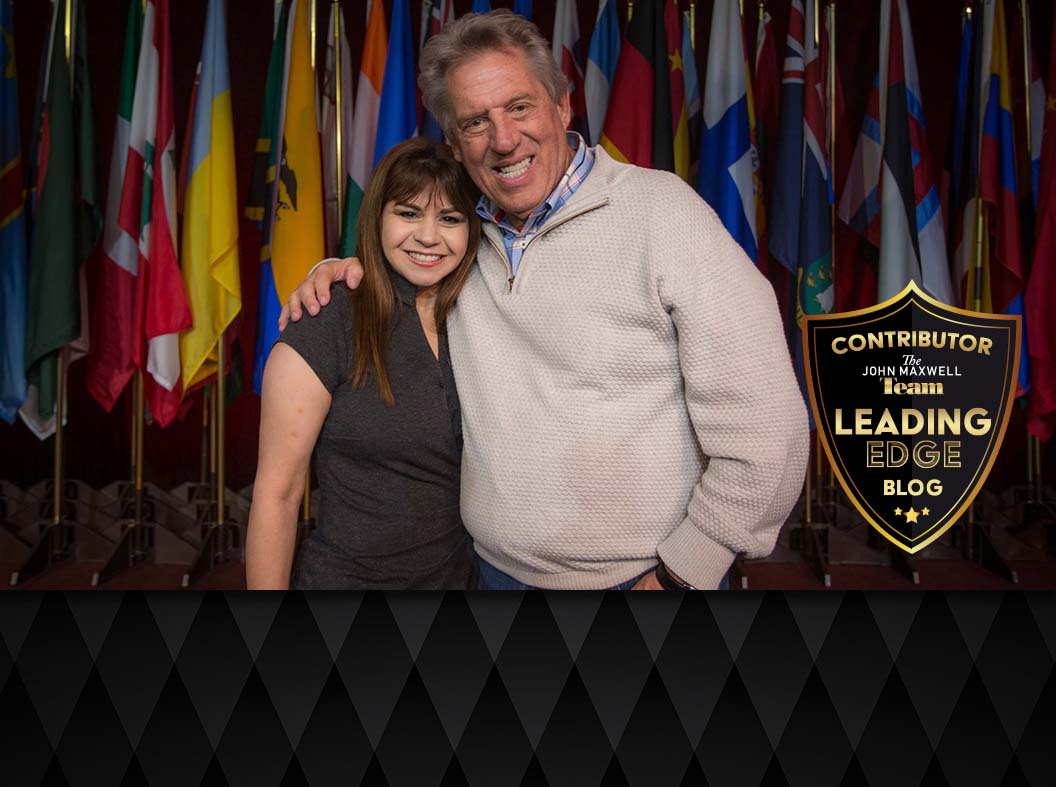The Leading Edge:
Business, Work, & Relationships – What does love have to do with it?

“Here are four simple steps to learn to love difficult people.”
– Marie Cosgrove, certified John Maxwell Team Coach, Speaker & Teacher
Is it an emotional or intellectual response?
Many of us think of romantic love when we hear the word love. However, the “love” most often overlooked is an outgoing concern for others as demonstrated by our actions. Outward demonstrations of our actions have a far more meaningful impact than feelings.
So, yes, love is both; an emotional and intellectual response, followed by action.
How can we show love in a fractured world?
Diagnosing is simple. Relationships are proven to work when you abide by standard values. When these seemingly common sense values are lost, there is a breakdown in culture and relationships.
My mentor, John Maxwell says that we must be “intentional about adding value to others and express value to them.”
Following John Maxwell’s wise counsel allows us to put aside our own self-interests in order to show sincere outgoing concern for others.
Last year, I was asked to speak at The Professional Development Institute and GirlsTown in Kingston, Jamaica. Before going up to speak, a presenter warned me that it would be very difficult to connect with the audience, particularly for me because I was a foreigner from the USA, unacquainted with Jamaican culture. However, what I did have was a deep outgoing concern for the young women I was speaking to. By showing sincere interest in their dreams and goals, they knew they were highly valued. To this day, we are still connected.
When we focus on restoring our relationships with our marriage partners, our friends, our fellow employees, and our neighbors through love, harmony, cooperation and outgoing concern, our relationships significantly improve, resulting in meaningful relationships that work.
Violating natural order of the “law of love” brings suffering, misery, and disappointment, manifesting in dysfunction and broken relationships.
So how can we apply this to dealing with difficult people in our daily lives?
A friend related this story on dealing with difficult people:
“When I was working in manufacturing, my path crossed an engineer who always had to be right. When I provided a solution, he always disagreed. His attitude made it difficult to resolve issues.”
Focusing on the needs of others eliminates time for you to worry about yourself and your ego. My friend learned to focus on the concerns the engineer expressed instead of his failings.
He said, “I realized the engineer enjoyed his job. He wanted the best for our company. As long as I allowed him to verbalize his viewpoint, he was happy. I began to take the focus off of ‘how difficult’ he was and instead directed it onto how I could help him achieve his goals.”
Here are four simple steps to learn to love difficult people:
1) Just as we expect others to be patient with our deficiencies, we need to be patient with theirs as well. Learning to be humble is necessary when dealing with difficult people. Being humble will allow us to strive for peace. Selfishness and conceit often get in the way of being truly humble and peaceable.
2) Be willing to let others go first. Sometimes we are faced with someone who always has to be right or have his or her way. It’s easy to get upset when someone behaves this way. When we are willing to yield to others, we are showing wisdom and strength, not weakness.
3) Address the situation at the earliest signs of trouble. Handling a boss or someone who seems to “have it in” for us can be difficult. The best way to defuse troubling situations is to address them directly with the person before the difficulty intensifies. Remember, the problem is between you and the other person who seems to “have it in” for you. Taking your issue to anyone else will only cause more trouble.
4) We should never treat someone the way we would NOT want to be treated. I recall having a conversation with someone who was at a more advanced level than I was while working on a project. During a phone call, he started to use profanity. I quickly let him know I would not continue a conversation that was disrespectful. I would wait until he was able to speak to me with the same respect I was showing him. He quickly apologized, and we were able to work together. When we are mistreated, give an example of “the Golden Rule” by treating others as we wish to be treated. When we do this, we make an impression upon those who mistreat us!
Through love, we can work towards peace instead of conflict, and will be able to better our relationships with problematic people. If we give the same respect and concern that we wish to receive, we can build formidable relationships.
About Marie
 Marie Cosgrove is an accomplished entrepreneur who has had the privilege of working with some of the most recognizable Fortune 500 companies, including FedEx and Sprint. Marie has successfully launched several medical device manufacturing companies and serves as part of The John Maxwell Team on the Presidential Advisory Council and as an independent speaker, mentor and coach. Marie is married, has 5 children, 3 grandchildren and a golden doodle. She enjoys all things outdoors (i.e. beaches, hiking, camping and sledding).
Marie Cosgrove is an accomplished entrepreneur who has had the privilege of working with some of the most recognizable Fortune 500 companies, including FedEx and Sprint. Marie has successfully launched several medical device manufacturing companies and serves as part of The John Maxwell Team on the Presidential Advisory Council and as an independent speaker, mentor and coach. Marie is married, has 5 children, 3 grandchildren and a golden doodle. She enjoys all things outdoors (i.e. beaches, hiking, camping and sledding).
